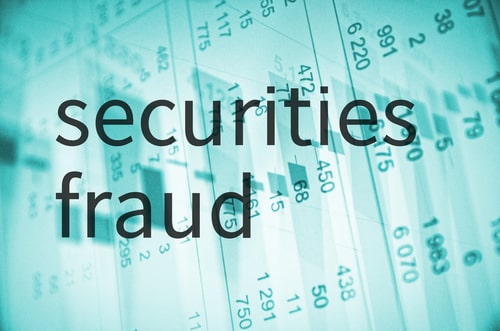Some Known Facts About Securities Fraud Class Actions.
Some Known Facts About Securities Fraud Class Actions.
Blog Article
Little Known Facts About Securities Fraud Class Actions.
Table of ContentsThe Best Strategy To Use For Securities Fraud Class ActionsSecurities Fraud Class Actions Things To Know Before You Get ThisSecurities Fraud Class Actions - QuestionsSee This Report about Securities Fraud Class ActionsThe Only Guide for Securities Fraud Class ActionsSecurities Fraud Class Actions Fundamentals Explained
Lots of safeties class activities will certainly contend least one acquired fit as a "tag-along" suit. In 1998, Congress passed the Stocks Litigation Attire Requirement Act (SLUSA) in an effort to close a loophole in the Exclusive Securities Litigation and Regulatory Enforcement Reform Act of 1995 (PSLRA) that allowed complainants' attorneys to submit national securities course actions in state courts.
Our litigators are experienced in attacking "need futility" claims made versus a board. We have actually achieved success in acquiring remains of the fit or exploration, know when to and when not to establish a special litigation committee, and exactly how to stay clear of having the tail wag the pet with respect to derivative suits and securities class actions.
Unknown Facts About Securities Fraud Class Actions
A specific financier who relied on the CEO's first declaration to acquire supply might take legal action against the firm prior to Fundamental; what Basic permitted is for matches including class activities to proceed even if the suing financiers did not understand about or straight depend upon the statement. The Court appears to have believed assisting in class activities this way would progress the twin purposes of anti-securities-fraud legislations: sufferer compensation and fraudulence deterrence.
An essential need of the presumption is that a supposed fraud should have really had some influence on the price of the protection traded by the plaintiffs; otherwise, the complainant can not be said to have actually relied on the fallacy, also indirectly.
Between 2002 and 2004, nearly fifty percent of all pending class actions in federal courts were safeties connected. Considering that 2012, securities-fraud matches have progressively boosted each year; most lately, there was a 7.
About Securities Fraud Class Actions
The PSLRA increased begging criteria and consisted of numerous other reforms; significantly, the original draft of the Act would certainly have removed the Standard anticipation entirely. While the PSLRA did decrease frivolous legal actions to some degree, the continuing rise in securities-fraud class actions recommends that extreme lawsuits stays a major trouble.
At a minimum, then, there seems support in the courts, the academy, and the legislature for both (1) reducing meritless securities-fraud filings and (2) guaranteeing that such cases, as soon as filed, do not make it through the motion-to-dismiss or class-certification stages of lawsuits. An opportunity to attain one or both of these goals via judicial intervention occurred in Halliburton II.
Halliburton II: The High court's Action to the Rise Halliburton II noted the 2nd time that the long-running class activity against Halliburton Co. for claimed safeties fraud after that in its thirteenth year had actually been before the High court. In 2011, the parties had actually clashed over whether plaintiffs have to show loss causation prior to or after class accreditation.
The Only Guide to Securities Fraud Class Actions

He believed a contrary ruling would certainly be weird due to the fact that the similar proof that offenders would present to reveal that there was no price effect was currently acceptable prior to class certification in order to respond to a component of the Fundamental presumption. If the evidence fell short to respond to that part of the presumption yet did verify that there had been no cost impact, an area court would certainly have to blind itself to this reality and license the class under the fraud-on-the-market concept, although the theory was plainly not applicable.
In addressing the two questions offered, Chief Justice Roberts bewared to his response prevent entering the spirited plan dispute over 10b-5 class activities. Halliburton did try to increase policy problems for instance, that securities-fraud class activities might "enable plaintiffs to obtain large negotiations. for meritless insurance claims." The Principal Justice claimed that these types of concerns were "a lot more appropriately dealt with to Congress," aiming out that Congress had verified itself willing to respond to "perceived abuses" of 10b-5 course actions by passing the PSLRA - Securities Fraud Class Actions.
Top Guidelines Of Securities Fraud Class Actions
He would have overthrown the Basic presumption, which in his view has caused "an unrecognizably wide reason of activity all set produced class accreditation" that is inconsistent with both the economic literary works and the Court's succeeding class-certification caselaw. Doubting that an opportunity for pre-certification reply would accomplish a lot, Justice Thomas contended that as a functional issue counterclaim had so far confirmed nearly difficult and would remain to be so even if allowed prior to course qualification.
Commentators and good sense alike suggested that by managing offenders a possibility to beat meritless claims before a class was licensed (and before the pressures to work out came to be frustrating), Halliburton II would allow those meritless insurance claims to in fact be defeated at a significant price. This Component suggests that Halliburton II's promise was an illusion and might have been identified as such on the day that the choice was provided, for one simple factor: the price-maintenance theory.
In concept, the rate impact to be rebutted can turn up in two means. The first supposed "front-end" price effect is apparent: a misrepresentation can cause a change in market assumptions about a security and set off an immediate swing in its cost. As an example, think the market anticipates a business to earn revenues of $100, the company actually does earn $100, however the CEO lies and reports profits of $125.
Not known Facts About Securities Fraud Class Actions
Since the market's expectations were met, the rate of the firm's supply should remain steady at the pre-misrepresentation baseline. The price-maintenance theory holds that there is price impact, because the misrepresentation stopped the market price from dropping as it would certainly have if the Chief executive officer had actually told the truth. Right here, too, rising cost of living will dissipate when a corrective disclosure leads the marketplace to integrate the reality into the marketplace cost.
Rather, offenders have to reveal that none of the price motion read here on the date of an alleged corrective disclosure was associated with the disclosure. This is an uphill struggle. There will certainly generally be some rate movement on that date, because complainants typically submit 10b-5 matches in the wake of a substantial rate modification alleging it was the outcome of a rehabilitative disclosure.
Consequently, offenders usually can not well show that none of the decline was associated with the rehabilitative disclosure, and this hyperlink the price-maintenance theory if valid has actually made it alongside impossible for defendants to rebut the presumption, even in meritless cases - Securities Fraud Class Actions. B. Complainants' Invocation and Courts' Acceptance of the Price-Maintenance Concept There is little concern that the concept stands
Report this page